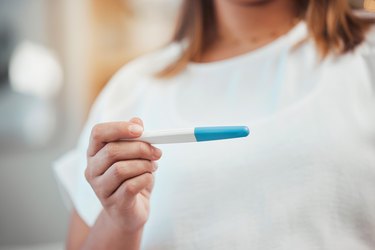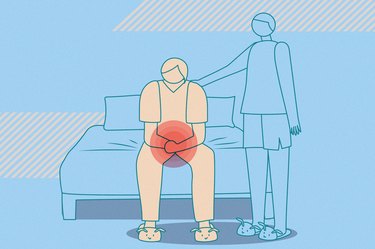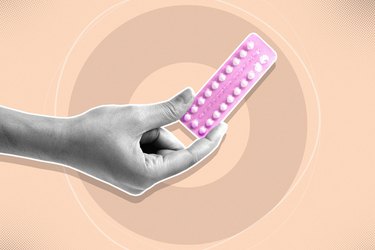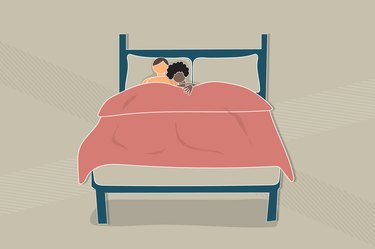
Even though getting pregnant is something we humans have been doing since, well, the dawn of time, there's still a lot of mystery around it. The process is complex, to say the least, and a lot of things have to go right in order for a baby to be the final result.
So if you're trying to get pregnant (or, you know, the opposite), you probably have a lot of questions. One of which might be: Can you get pregnant on your period?
Video of the Day
Video of the Day
Here, we'll answer that question and dig into how the menstrual cycle affects your fertility.
So, Can You Get Pregnant if You Have Sex on Your Period?
While it's unlikely to conceive while your uterus is still shedding (what we refer to as menstrual blood), it's not impossible, says Anate Brauer, MD, ob-gyn, a reproductive endocrinologist with Shady Grove Fertility. It all has to do with when in your cycle you ovulate.
Ovulation typically occurs on the 14th day of an average menstrual cycle and lasts for 12 to 24 hours; however, not every person ovulates at the same time in their cycle. While one person may ovulate on day 14, someone else may ovulate as early as day 6 or 7 or even as late as day 20, Dr. Brauer explains.
Those who tend to ovulate on the earlier side of their cycle may still be on their period.
What's more: Dr. Brauer points out that sperm can live inside the reproductive tract for up to five days. This means that if you have sex toward the end of your period, sperm can still hang around long enough to fertilize an egg that is released days after your period ends.
Sometimes vaginal bleeding is due to other causes aside from a period. In fact, you could have irregular menstrual bleeding that's the result of a hormonal condition such as polycystic ovary syndrome (PCOS) or endometriosis, as well as uterine polyps or fibroids, per The American College of Obstetricians and Gynecologists (ACOG).
In a menstruating person who has irregular vaginal bleeding, a "period" may be mistaken as an actual menstrual withdrawal bleed, explains Mark Trolice, MD, an infertility specialist at Florida's Fertility Care IVF Center. "Ovulation can occur during any vaginal bleeding that can be mistaken for a real period, during which pregnancy can still occur," he says.
How the Menstrual Cycle Affects Your Fertility
The average menstrual cycle occurs every 28 days, with an ovulation window of around day 13 to 15 of the cycle, per ACOG. However, a typical "normal" cycle can still range between 21 and 35 days, which basically means that the ovulation day is either earlier or later in the cycle, explains Banafsheh Kashani, MD, ob-gyn, a reproductive endocrinologist specializing in infertility. (Fun fact: That's also why some people can get their period twice in a month.)
"If your menstrual cycle is regular, then it is easier to predict your fertile window as you know your ovulation date or range of ovulation dates," she says. "In women who have menstrual cycles that are irregular, it is difficult to determine when ovulation may occur, and as a result this makes it harder to achieve a pregnancy, and therefore, you are less fertile."
How to Prevent Pregnancy During Your Period
Although it's not very likely, you can get pregnant if you have unprotected sex on your period (or right before your period, or at the end of your period or right after your period — it's all technically possible). So don't count on timing as your best method of contraception.
Here are some better ways to prevent pregnancy during your period, according to ob-gyns.
1. Use a Reliable Form of Contraception
The best way to prevent pregnancy during your period is to make sure you're using a reliable form of contraception. "Women who are on hormonal contraception or who have an intrauterine device (IUD) may still have monthly bleeding but would otherwise be protected from pregnancy during that time," says Natalie Stentz, MD, ob-gyn and fertility specialist.
"Condoms are another great option when used correctly — either alone or with other contraceptive methods — as they provide additional protection against sexually transmitted infections," Dr. Stentz says.
2. Get to Know Your Menstrual Cycle
Because not everyone has a 28-day cycle every month, it's important to become well acquainted with your menstrual cycle and your body, Dr. Stentz says.
"Many fitness trackers and apps can help you gain insight into your menstrual trends and predicted days of ovulation," she says. "This data can be used to help either be extra cautious to avoid pregnancy or to help time attempts at pregnancy during your most fertile days."
3. Use the 'Pull-Out Method'
To be a step safer while having sex on your period, Dr. Kashani points out that using what's referred to as the "pull-out method" could be helpful. This involves removing the penis from the vagina prior to ejaculation to prevent any sperm from getting inside.
"Unfortunately, this method is only 80 percent effective when ovulation does occur within a five-day timeframe from intercourse, so it's better to use this as a last-ditch effort," she says. Or in addition to other, more reliable contraceptive methods.
The Bottom Line
The chances of getting pregnant while on your period are fairly low, especially if you have a regular 28-day menstrual cycle. But low is not zero; so, if preventing pregnancy is your goal, make sure to use a reliable form of contraception any time you have sex.
- Anate Brauer, MD, OB/GYN, a reproductive endocrinologist with Shady Grove Fertility
- Mark Trolice, MD, an infertility specialist at Florida’s Fertility Care IVF Center.
- ACOG: The Menstrual Cycle: Menstruation, Ovulation, and How Pregnancy Occurs
- Banafsheh Kashani, MD, OB/GYN, a reproductive endocrinologist specializing in infertility.
- Natalie Stentz, M.D., OB/GYN and fertility specialist
Is this an emergency? If you are experiencing serious medical symptoms, please see the National Library of Medicine’s list of signs you need emergency medical attention or call 911.


